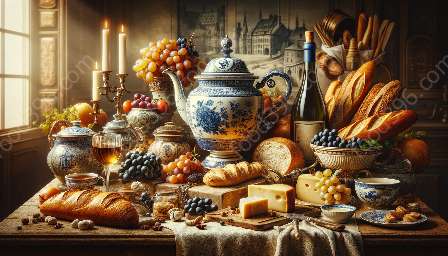French cuisine has a rich and diverse history that dates back centuries, evolving through a tapestry of influences to become one of the most revered culinary traditions in the world. Its origins can be traced to ancient Gaul and the influences of Roman, Moorish, and Italian cuisines, among others.
Ancient Gaul and Early Influences
The roots of French cuisine can be traced back to the ancient Gauls, who inhabited present-day France. Their diet consisted largely of grains, dairy, and meats, including wild game and fish. The Gauls also preserved foods through salting, smoking, and fermentation, laying the groundwork for traditional preservation methods that are still used in French cuisine today.
With the Roman conquest of Gaul in the 1st century BC, the region saw the introduction of olive oil, wine, and new culinary techniques. Roman influence brought an array of herbs, spices, and cooking methods, enriching the local gastronomy.
Medieval France and Culinary Renaissance
During the medieval period, French cuisine underwent a renaissance, influenced by the amalgamation of culinary practices from both the aristocracy and the common people. Nobles dined on lavish feasts featuring meats, exotic spices, and elaborate pastries, while the commoners relied on simpler, locally sourced ingredients.
One of the most significant contributions to French cuisine during this period was the introduction of new ingredients such as carrots, spinach, and artichokes from the Middle East. The use of spices, including cinnamon, ginger, and saffron, also became more prevalent, reflecting the growing trade with the East.
Renaissance and Culinary Arts
The Renaissance brought about a flourishing culinary culture in France, with an emphasis on aesthetics and refinement. The court of Catherine de' Medici, who married King Henry II of France, played a pivotal role in introducing Italian culinary influences, including pasta dishes, to the French court.
Catherine's influence on French gastronomy extended beyond just food, as she also brought with her a brigade of Italian chefs, sparking a culinary revolution in France. The merging of Italian and French culinary traditions laid the groundwork for the development of haute cuisine, characterized by meticulous preparation and artistic presentation of dishes.
The Influence of Colonization and Global Trade
The Age of Exploration and colonization played a pivotal role in shaping French cuisine. French explorers and colonialists brought back a wealth of exotic ingredients, including spices, fruits, and vegetables, from their colonies in the Americas, Africa, and Asia, leading to a fusion of flavors and culinary techniques.
Moreover, global trade opened up new avenues for culinary exchange, with the importation of coffee, tea, chocolate, and sugar introducing new flavors and preparations to the French palate, enriching their culinary repertoire.
The French Revolution and Culinary Evolution
The French Revolution brought about significant changes in French society, including the culinary landscape. The revolution led to the abolishment of the aristocratic kitchens and the emergence of professional chefs, who previously served in noble households, now applying their culinary expertise in restaurants and cafes.
The revolution also marked the rise of the bistro culture, characterized by simple, hearty fare that catered to the tastes of the working class. This shift in dining culture led to the democratization of French cuisine, making it accessible to a wider audience and influencing the development of regional culinary specialties.
Modern Era and Contemporary Trends
The modern era has witnessed a continued evolution of French cuisine, influenced by globalization, multiculturalism, and changing dietary preferences. French chefs have embraced innovation while preserving traditional techniques and ingredients, creating a balance between classical and contemporary expressions of French gastronomy.
Furthermore, the designation of French gastronomy as an intangible cultural heritage by UNESCO in 2010 has underscored the significance of French culinary traditions and has served to safeguard and promote its legacy on the global stage.
Today, French cuisine continues to captivate food enthusiasts worldwide, with renowned chefs pushing the boundaries of culinary creativity while honoring the time-honored traditions that have shaped the culinary identity of France.

